- Home
- Jeannie Wycherley
The Wonkiest Witch
The Wonkiest Witch Read online
Copyright © 2018 Jeannie Wycherley
Bark at the Moon Books
All rights reserved
ISBN-13: 978-1726008884
ISBN-10: 1726008886
Publishers note: This is a work of fiction. All characters, names, places and incidents are either products of the author’s imagination or are used fictitiously and for effect. Any resemblance to actual persons, either living or dead, is entirely coincidental.
No part of this book may be reproduced, distributed or transmitted in any form or by any means, including photocopying, recording, or other electronic or mechanical methods, or by any information storage and retrieval system without the prior written permission of the publisher, except in the case of very brief quotations embodied in critical reviews and certain other non-commercial uses permitted by copyright law.
Sign up for Jeannie’s newsletter: http://eepurl.com/cN3Q6L
Edited by Anna Bloom @ The Indie Hub
Cover design by JC Clarke of The Graphics Shed.
Given that it is rare for me to write anything my wonderful Mum would like to read, I am pleased that she will have a chance to enjoy this one.
No blood and guts in this one.
Carole Anne Sharp
Love you!
Contents
Chapter 1
Chapter 2
Chapter 3
Chapter 4
Chapter 5
Chapter 6
Chapter 7
Chapter 8
Chapter 9
Chapter 10
Chapter 11
Chapter 12
Chapter 13
Chapter 14
Chapter 15
Chapter 16
Chapter 17
Chapter 18
Chapter 19
Chapter 20
Chapter 21
Chapter 22
Epilogue
Need more Wonky?
Acknowledgments
Coming Soon
Find The Author
Also by
We had chosen an early morning to say goodbye to Yasmin Daemonne. Now the mist rolled around the mourners, and without a lot of room in the small forest clearing, we huddled together by necessity. I glanced around at the congregation, amazed that my mother warranted such a gathering.
Yasmin and I had never really seen eye-to-eye.
Yet here were the great, the good … and the not so good. Witches, wizards, warlocks and even the occasional Fae. Without exception everyone had dressed for the occasion. Clad in ceremonial mourning robes of black or midnight blue, some trimmed in ermine, the fairies in the finest silk. Witches from Yasmin’s coven wore complex headdresses of delicately woven twigs, dressed in moss and leaves and early blossoming spring flowers, freshly picked and prepared this morning no doubt, the whole shebang trimmed with black ribbon.
For my part, I had opted for plain black robes. They buttoned tightly at the neck, fitted snugly over my chest, rounded over my hips—thereby hiding a multitude of sins—and fell to the floor. Underneath these, I had chosen to wear a plain black wool dress and my thick-soled black boots. My robes rarely had an outing these days and as I’d put on weight in recent years, they were a tad snug for my liking. But what did it matter? I fully intended to burn the darn things when this ceremony had ended and my duties had been completed.
I hadn’t been part of such a gathering since I finished school at eighteen, and that was over a decade ago, and I was finding the whole magickal ceremony overtly onerous.
The wizard in charge of the ceremony, the elder Luca Shadowmender, led us through a series of blessings, committing Yasmin to a world beyond, bidding her the fairest of walks in the Summerlands, where she would be at peace among her foremothers and fathers. We closed with a ritual of course; walking around the fire at the centre of the clearing, drawing on the elements, grounding ourselves in the earth but aspiring to soar through the air with Yasmin’s spirit. I went through the motions with them, well versed in all aspects of witchcraft even though it was no longer my chosen path. Finally, Shadowmender called on the Goddess to lead Yasmin by the hand to a brighter day, and I took that as my cue to step forward and douse the flames of the fire with a handily placed pail of water.
Nothing magickal about that.
I remained in place, watching the smoke, with its varying shades of grey and white, as it coiled and uncoiled and drifted skywards. Perhaps the smoke was my mother’s soul. Well, if it was, she was free now.
Shadowmender hobbled across the clearing to stand with me, leaning heavily on his staff and regarding me through rheumy eyes. I blinked back unexpected tears and offered him a half-smile.
“We’re all very sorry for your loss, Alfhild,” he murmured, directing nods at the others as they took their leave of the circle.
“Thank you,” I replied. It seemed easier not to remind him that my mother and I had been estranged for several years. In any case, I was having some difficulty processing my feelings regarding Yasmin’s death.
“She was a friend to all in need, a remarkable teacher and a powerful witch.”
I acknowledged the tribute quietly. Maybe I had been the only person who had found her shrewish and difficult then? Or perhaps – more likely - the fault lay purely with me, her errant daughter. After all, I had rejected my calling as a witch so consistently and adamantly that my mother had despaired. I had pleaded with her to allow me to follow my own path, no matter where that would lead. In the heat of one particularly vicious argument she had scolded me, informed me of how ashamed she was, and banished me henceforth from her dwelling place.
Harsh words and recriminations. I shuddered at the memory of my mother spitting sparks of anger.
She had never understood that all I had ever wanted to be - was normal. To live among humans and do ordinary things. Whether that consisted of lounging in front of the television, or pogoing at a rock concert. I loved to bake – with flour and eggs and butter – rather than ground bat bones and gristlewhort foraged from a hedge. And yes, I chose to live in jeans and t-shirts rather than thick wool or velvet, or worse still, sturdily made clothes, all the better for outdoor activities. My one nod to my background? My goth make-up and penchant for black clothes. Yes, my jeans were black and my t-shirts were black and my eye-liner was black. But working as I tended to in pubs and night clubs, I never looked out of place.
Unfortunately, my mother had obstinately stuck to her guns and discounted any notion that her precious only daughter, Alfhild, could have a life outside the craft. Her total intransigence had eventually forced me to pack my bags and walk away for the sake of my sanity and my mother’s blood pressure. That had been twelve years ago and we had rarely spoken since.
And now it was too late.
“I’m an orphan now,” I intoned, so softly that Wizard Shadowmender could barely hear me.
The fire at my feet, supposedly doused with the water, gutted and sparked, and a single flame shot high into the air. I stared at it perplexed. What did it portend? In my mundane life it would simply mean I hadn’t doused the flames well enough, but here in this clearing, surrounded by some of the most powerful witches and wizards in the land, I could only imagine that it must mean something else entirely.
The funeral supper was a jolly affair, held at The Full Moon, a public house in the centre of London on Celestial Street, known only to those who absolutely needed to know about it. Access to the pub was via an ordinary looking bookshop on Charing Cross Road. If you knew the right shelves to push - in the occult section naturally - you spun though to a dark, cobbled alley lined with all manner of useful magickal retail outlets, including: Pointitatem’s, a wand shop obviously; Basildon Bonded, a stationer’s – perfect for all your
Book of Shadows requirements; Fidl - a supermarket specialising in frogs, toads, newts and all manner of sundries; and my personal favourite, The Familiar Shoppe, which sold an assortment of accessories for your familiars, whatever they might be, including cat scratching posts, cat toys, dog baskets, bird perches, and handmade decorative jewellery for unicorn horns.
The Full Moon was a tall, narrow pub, arranged over four floors, perfect for drinking and carousing, with rooms above where revellers could stay overnight. Today it was full to capacity, pulsing to the music emanating from the jukebox. Every day was Halloween at The Full Moon, and just now The Grateful Dead’s Sugar Magnolia was blasting out of dozens of speakers, and entertaining the gathered throng. I wondered who had programmed the song, it being one of Yasmin’s favourites.
I perched on a cushion strewn bench in the main bar, receiving consolations from each funeral guest in turn. I tried to be present in the moment, but increasingly found myself on automatic pilot, alternately commiserating or lamenting, smiling and chatting, as each situation—and each individual—warranted. My face hurt, my head ached, and beneath my robes I felt overly warm, the wool making me itch.
How much longer?
I glanced—surreptitiously I thought—at my watch, but when I looked up again found myself being appraised by a skinny woman with sharp features, her black robes tightly melded to her skeletal form and eyes that pierced my very soul.
Curiously, I stared back until, at last, the woman contrived a smile and slunk over to where I perched.
“Penelope Quigwell,” she said and stuck out a bony hand. I took the woman’s hand in my own plump and slightly sweaty palm, marvelling at the transparency of Penelope’s skin. “I am your mother’s lawyer.”
“Was, surely?” I asked, a little acerbically. “You were my mother’s lawyer. She’s dead. That’s what we’re here for.” I almost added the word, celebrating, but reined myself in. It probably wouldn’t be appropriate, might be misunderstood, and I figured I’d been rude enough.
Penelope turned the corner of her mouth up. “I am your mother’s lawyer until her estate has been disposed of.”
“Estate?” I frowned. The dismal little hen coop where my mother dwelled, way down in the depths of the Somerset countryside didn’t warrant so grand a title. A stray match would take care of it along with my mother’s limited belongings. Yasmin had lived a simple life, with a hard wooden bench that doubled as both bed and sofa, a range with a large iron cauldron, and a larder where she saved her assortment of odds and ends for her peculiar collection of lotions and potions. She rarely kept any food in the house, and her clothes hung on a peg behind a curtain.
“Yes. Your late mother had a sizeable estate and you, my dear, are the sole heir.”
“There must be some mistake,” I shook my head. If Yasmin had money, why had she chosen to live so austerely?
Penelope drew herself upright, her face haughty. “No mistake.” She handed over a card. “I’d like to see you in my office tomorrow, if you would be so kind. 10 a.m. sharp.” With a snap of her head, Penelope spun on her spiky 6-inch heel, and disappeared into the throng of people gathered around the bar area.
I watched her make her way towards the exit, before glancing at the card in my hand. It was blank, but when I held it up, a cloud of black ink flooded across the stiff white vellum from top right to bottom left. It drifted across the card like dark sand, and then disappeared, leaving only a trace with the words:
Penelope Quigwell LLB
Lawyer
14b Celestial Street
London
W00 0OO
I sank back against the wood panelled wall behind me and stared around at the faces that claimed to have known and been friendly with my mother. I knew so few of them. For someone who had long eschewed the world of magic and witchcraft, I couldn’t help but wish I knew more about what had been going on in my mother’s life.
I’d overslept.
This was a common enough occurrence given that my work pattern tended to be from 6 p.m. to 2 a.m. I rarely rose before midday, and disliked early mornings intensely. As far as I was concerned, sunrises were for losers.
Now I stretched in my single bed and glanced at the clock, acknowledging it was after 9, and vaguely remembering I had somewhere I needed to be.
Rats! My appointment with Penelope Quigwell.
I rolled out of bed, untangling myself from the covers. To shower or not to shower, that was the question. I lifted my arm and sniffed. No, I definitely needed to shower. Running a hand through my untamed mop of hair I realised I probably required a shampoo too. I stank of smoke and beer. Needing to get a move on, and praying my flatmate wasn’t in the bathroom, I thundered down the hall like a fairy elephant and skidded to a stop in front of the steamy bathroom. I shared a house with three other women, and someone somewhere was always taking bath.
I was in luck.
Twenty minutes later, still damp from the shower, I hopped around my bedroom, scoping the floor for something smart enough to wear to a lawyer’s office. My tiny bedroom was far too small to house a wardrobe, and the one built-in cupboard that existed overflowed with books and t-shirts. Running rapidly out of time, I plumped for a long black skirt, a plain black t-shirt and a black cardigan. Relatively smart.
In the hall, I glanced momentarily at my reflection, then smudged the remainder of yesterday’s eye make-up a little and decided I’d do.
I’d have to, I’d run out of time.
Remarkably I landed myself a seat on the train.
I always enjoyed these short commuter journeys on the rickety old South London trains, casually observing my fellow travellers, while pretending to study the colourful maps and advertisements displayed above the top of their heads. Today I shared a carriage with the usual number of men and women in sharp suits and spotless shirts and blouses, no doubt scurrying between appointments and meetings; teenagers with huge headphones wrapped around their heads, nodding away to feral music; some Japanese tourists giggling into their phones and taking selfies; and a woman at the far end of the carriage who clutched a black velvet bag to her chest, rocking and muttering to herself, recognisably a witch, and down on her luck. As the train pulled into Charing Cross, I purposefully walked down the carriage and slipped a twenty pound note into the woman’s hand. It wasn’t much, but perhaps it would help her.
She crooned softly as I walked away, blessing me and wishing me good fortune. I returned her blessings and headed out of the station, glad to be in the open air on a spring day, even if it was smoggy and toxic in central London. I dashed along the road a little way to the Celestial Street Bookshop.
Celestial Street was quieter at this early time of day. Perhaps mornings aren’t a good time for anyone of a darker persuasion? I hurriedly made my way into the alley, tuned left, slipping over the cobbles, searching for number 14. It transpired that number 14 was a clock shop called Once Upon a Time. I stood transfixed for a minute, staring through the window at the hundreds of clocks on display, all ticking and tocking and clicking and whirring, pendulums large and small swinging to and fro. As the large hand clicked over to the three, the shop erupted with a cacophony of chiming, beeping and chirruping. Dozens of cuckoos leapt out of their casings and shrieked open mouthed at me. I stifled a giggle. Working in there would be enough to drive you barmy.
The reminder of the time hurried me along.
Confused about exactly where I should be headed, I was about to enter the shop when I noticed a small black door to my left, with the characters 14b displayed in dull bronze.
I pushed a button for the intercom but nothing seemed to happen. With no noticeable bell to ring, and no knocker, I considered banging with my fist, but tried pushing the door first and found it on the latch. I made my way up a rickety flight of stairs onto the first landing, where a grumpy and sour-faced male receptionist, an older, thinner and more miserable version of Penelope Quigwell, wrote my name in a ledger. He made a great show of recording the tim
e, before escorting me down a narrow hallway to the lawyer’s office.
Penelope peered up from above her spectacles as I entered. Sitting behind an enormous and ornately carved wooden desk covered in green baize, she still managed to look intimidating in spite of her diminutive size.
“Ah, Ms Daemonne. At last. I was worried you weren’t going to make it.” I began to apologise but Penelope waved the words away. “Please take a seat,” she requested.
I clip clopped across the shiny parquet floor to sit on the only other chair in the room. It was hard and uncomfortable, not somewhere you would want to remain for too long. I glanced around the room. The walls were lined with bookshelves, dozens of leather volumes neatly displayed on each shelf. Legal works. I wondered if Penelope had read all of them.
Penelope drew a file from a drawer under her desk and placed it carefully on the surface in front of her. The cover of the brief, once cream, had faded to a dull yellow. She opened it, turning over the first page, scanning the next one, and finally peering back towards me.
“Your mother’s will was a simple one. You are her only child and therefore her estate falls entirely to you.”
I nodded, thinking again of the hen coop in the woods. “There really isn’t very much to worry about though, is there?”
“Well that’s not entirely true.” Penelope steepled her fingers together and pursed her lips, regarding me with a certain amount of disdain. I cocked my head to one side and waited for Penelope to explain further.

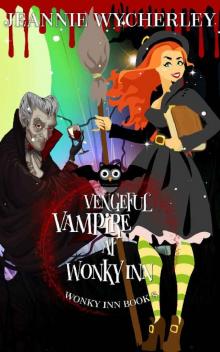 Vengeful Vampire at Wonky Inn: Wonky Inn Book 8
Vengeful Vampire at Wonky Inn: Wonky Inn Book 8 The Wonkiest Witch
The Wonkiest Witch Ain't Nothing but a Pound Dog
Ain't Nothing but a Pound Dog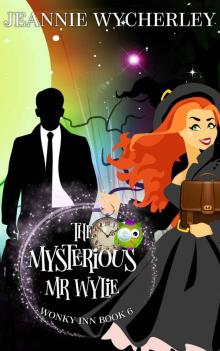 The Mysterious Mr Wylie: Wonky Inn Book 6
The Mysterious Mr Wylie: Wonky Inn Book 6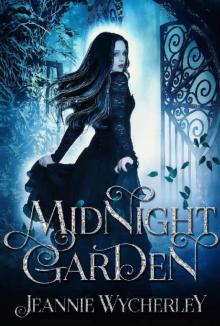 Midnight Garden
Midnight Garden Witching in a Winter Wonkyland: A Wonky Inn Christmas Cozy Mystery
Witching in a Winter Wonkyland: A Wonky Inn Christmas Cozy Mystery The Great Witchy Cake-Off
The Great Witchy Cake-Off The Great Witchy Cake Off: Wonky Inn Book 7
The Great Witchy Cake Off: Wonky Inn Book 7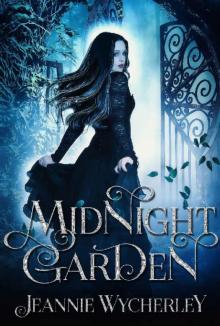 Midnight Garden (The Extra Ordinary World Novella Series Book 1)
Midnight Garden (The Extra Ordinary World Novella Series Book 1)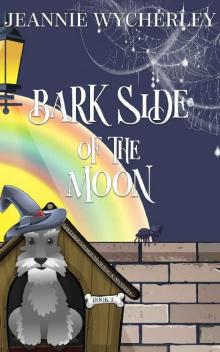 Bark Side of the Moon: A Paranormal Animal Cozy Mystery (Spellbound Hound Magic and Mystery Book 3)
Bark Side of the Moon: A Paranormal Animal Cozy Mystery (Spellbound Hound Magic and Mystery Book 3) A Gaggle of Ghastly Grandmamas: Wonky Inn Book 9
A Gaggle of Ghastly Grandmamas: Wonky Inn Book 9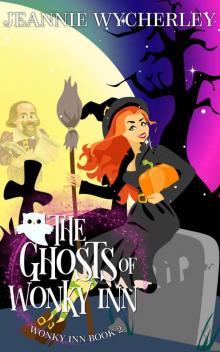 The Ghosts of Wonky Inn: Wonky Inn Book 2
The Ghosts of Wonky Inn: Wonky Inn Book 2 Keepers of the Flame: A love story
Keepers of the Flame: A love story Black Bess
Black Bess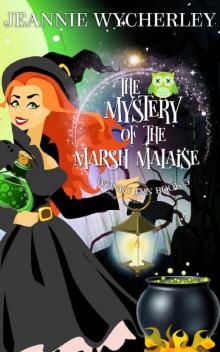 The Mystery of the Marsh Malaise: Wonky Inn Book 5
The Mystery of the Marsh Malaise: Wonky Inn Book 5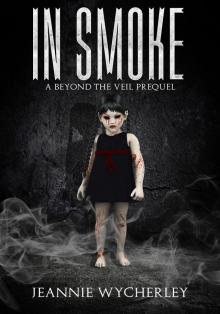 In Smoke eBook ready
In Smoke eBook ready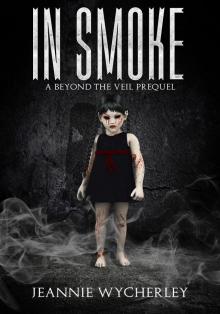 In Smoke
In Smoke